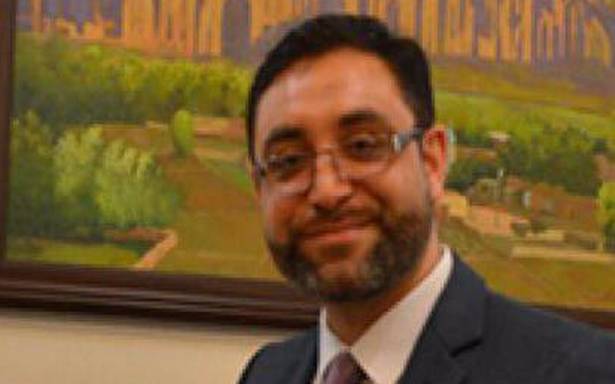Expected more from India, says Ambassador about visas issued to Afghans
Four months after the collapse of the government in Afghanistan to Taliban forces, its Embassy in Delhi faces a bleak future with no financial assistance, and an unclear formal status. The embassy headed by Ambassador Farid Mamundzay, who was only posted to India earlier this year, now comprises a small staff of 20 Afghan diplomats, while the local Indian staff have had to be cut back on given budgetary constraints. While Mr. Mamundzay declined to speak on discussions with the Government of India for support, he admitted the embassy was disappointed by the small number of visas granted to Afghans in need by India, and hopes that more food and medical aid would be forthcoming after the first batch was sent by air last week.
“Running an embassy requires policy, administrative and financial support. At present, none of the 70 Afghan missions worldwide, with the possible exception of Beijing and Islamabad are receiving any support from Kabul,” Mr. Mamundzay told The Hindu, sitting at his office in Delhi’s diplomatic enclave, where ousted President Ashraf Ghani’s photograph still adorns the wall above his desk. When asked why, Mr. Mamundzay shrugged, adding that it is unclear whose photograph should replace it.
“At present, we represent the geographic landmass and people of Afghanistan…we represent a republic that is lost for the moment,” he said, in a reference to the Taliban’s decision to recast its interim regime as the “Islamic Emirate of Afghanistan”, with a Taliban flag. However, like most of the other 70 missions, the Delhi Embassy has retained the republic and its tricolour flag of black, red and green. According to the diplomat, until the Taliban forms a formal government that is inclusive, representative and keeps promises made, including on the rights of women and minorities, the embassy cannot represent it. “For now, we have lost a state, and the results are catastrophic”.
Dwindling resources
The Ambassador noted that he was worried about how long the Embassy and the consulates in Hyderabad and Mumbai could continue to run on fast dwindling resources, and only the fees from consular services to rely on in order to afford the roughly $1.2 million (approximately Rs. 9.1 crore) they have spent annually thus far. Sources said that the Embassy might now consider renting out its housing to diplomats of other countries, even as it is clear that the mission is stretched, cutting back on services, staff and electricity on the premises.
The Ministry of External Affairs did not respond to a query about what support if any, it proposed to give the Embassy. During the last Taliban regime from 1996-2001, New Delhi assisted the Embassy, which officially represented the Government of President Rabbani that India continued to recognise.
However, the Ambassador stated that he was far more concerned about the flight of Afghans who were facing food shortages and an economic crisis. Amidst growing reports of malnutrition and violence from Afghanistan, Mr. Mamundzay said New Delhi’s decision to cancel all pre-existing visas, and issuing, according to an answer in Parliament, only 200 visas, was well below what they had hoped for.
“We certainly expected more from India,” said Mr. Mamundzay. “We acknowledge their security concerns, and the fact that it is not possible to verify each new case, but what about those who have been coming to India for years, close friends of India. They continue to wait, and they haven’t been fairly treated,” he added, estimating that about 40,000-50,000 Afghans desperate to leave, including military cadets, students, businessmen, patients and those who had been granted scholarships by the Indian Council for Cultural Relations, who had applied for e-visas, were “losing hope”.
No flights
Even if visas came through, he pointed out, travel to India was virtually impossible as there were no commercial flights at present. One positive development was the government’s decision to allow a Kam Air flight, the first since August 15, to land in Delhi last week carrying 10 Indians and 90 Afghans, mostly members of the Sikh and Hindu community, and carrying back medical aid for the Indira Gandhi Institute of Child Health in Kabul.
“We hope there will be more such flights,” Mr. Mamundzay observed, remarking with a tinge of sadness, “When no government exists to protect basic rights of people, then horrifying tragedies unfold in various forms not only at home but also abroad.”
Source: Read Full Article

